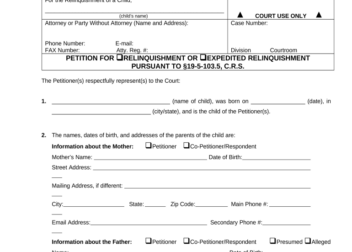A Guide to Spousal Abandonment Laws in California
Spousal abandonment can be a confusing and emotional topic. It refers to a situation where one spouse leaves the other without consent or intention to return. In California, this can have significant legal implications, especially concerning divorce and child custody. Understanding what constitutes abandonment and the legal aspects surrounding it is crucial for anyone facing this difficult situation. By knowing your rights and options, you can better navigate the complexities of family law in California.
Legal Definition of Abandonment in California

In California, spousal abandonment is defined legally as one spouse leaving the marital home without the other spouse’s consent and without a justifiable reason. It does not simply mean physical absence; it also involves the intent to sever the marital relationship. Key points to understand include:
- Intent: The abandoning spouse must have a clear intention to leave the marriage.
- Duration: Typically, the absence should last for a specific period, often six months or more.
- Emotional and Financial Support: The abandoning spouse’s refusal to provide emotional and financial support may also play a role in defining abandonment.
Understanding this legal framework helps clarify your position if you find yourself in such a situation.
Signs of Spousal Abandonment

Recognizing the signs of spousal abandonment can help you identify whether you might be facing this situation. Here are some common indicators:
- Physical Departure: One spouse leaves the home without discussing it with the other.
- Emotional Withdrawal: A noticeable decline in emotional connection or communication between spouses.
- Financial Neglect: The abandoning spouse stops contributing to shared expenses or family needs.
- Lack of Communication: Limited or no contact from the spouse who has left, making it difficult to resolve issues.
If you notice these signs, it may be time to consult with a legal professional to understand your options and rights. Early intervention can make a significant difference in your situation.
Legal Rights of Abandoned Spouses
When a spouse is abandoned, it can be an emotionally challenging experience, but it’s essential to know that there are legal rights in place to protect you. Understanding these rights is crucial for navigating the next steps in your life. Abandoned spouses often have the following legal rights:
- Right to Support: You may be entitled to spousal support if your spouse has left you without providing financial assistance.
- Division of Property: Abandoned spouses have rights to a fair division of marital property, regardless of who initiated the separation.
- Child Custody and Support Rights: If you have children, abandonment can affect custody arrangements and child support obligations.
- Right to Seek Legal Recourse: You can take legal action against your spouse for abandonment, which may include filing for divorce or seeking financial compensation.
Being aware of these rights can empower you to make informed decisions during this difficult time. It’s often advisable to consult a family law attorney to ensure your rights are protected.
How to File for Abandonment
If you find yourself in a situation of spousal abandonment, knowing how to file for abandonment can help you take control of your circumstances. Here’s a step-by-step guide:
- Document Evidence: Gather evidence of abandonment, including dates, communications, and any financial neglect.
- Consult an Attorney: Speak with a family law attorney who can provide guidance tailored to your situation.
- Prepare Legal Documents: Your attorney will help you prepare necessary documents, such as a petition for divorce or legal separation.
- File with the Court: Submit your documents to the appropriate court in your jurisdiction. This may involve paying a filing fee.
- Serve Your Spouse: Legally notify your spouse of the filed documents. This can be done through a process server or by certified mail.
- Attend Court Hearings: Be prepared to attend any hearings related to your case, where you’ll present your evidence and arguments.
Taking these steps can help you seek the justice and support you deserve.
Effects on Divorce Proceedings
Spousal abandonment can significantly impact divorce proceedings in several ways. Understanding these effects can prepare you for what to expect:
- Grounds for Divorce: In California, abandonment is considered a valid ground for divorce, which can simplify the process.
- Property Division: Courts will assess the abandonment in terms of property division, often favoring the abandoned spouse.
- Spousal Support: An abandoned spouse may have a stronger claim for spousal support due to the lack of financial assistance from the other spouse.
- Child Custody Decisions: Abandonment may influence custody arrangements, as courts typically prioritize the stability of the children.
- Emotional Impact: The emotional toll of abandonment can affect the decision-making process during divorce, making it crucial to have support.
Being aware of these effects can help you navigate the legal landscape more effectively and make informed decisions about your future.
Impact on Child Custody and Support
When a spouse abandons the family, it can have serious implications for child custody and support arrangements. The courts in California prioritize the best interests of the child when making custody decisions. If you are the abandoned spouse, understanding these impacts is crucial for securing your child’s future. Here are some key considerations:
- Custody Arrangements: The abandoning spouse’s actions can influence custody decisions. Courts may favor the parent who has remained in the child’s life, as stability is often prioritized.
- Child Support Obligations: The abandoning spouse may still be required to pay child support. Their financial responsibilities do not disappear simply because they left.
- Visitation Rights: The court may restrict visitation rights for the abandoning spouse if their departure is seen as detrimental to the child’s well-being.
- Parental Responsibilities: Courts will assess the level of involvement each parent has had in the child’s life, which can affect custody and support outcomes.
Being aware of these factors can help you advocate for your child’s needs during this difficult time. Consulting with a family law attorney can further clarify your rights and responsibilities.
Seeking Legal Assistance
Finding yourself in a situation of spousal abandonment can be overwhelming, and seeking legal assistance is a wise step. Having a knowledgeable attorney can make a significant difference in your case. Here’s why legal help is essential:
- Expert Guidance: An attorney specialized in family law can provide personalized advice based on your unique circumstances.
- Document Preparation: Legal professionals can help prepare all necessary documents accurately, ensuring that you meet all filing requirements.
- Representation in Court: Having legal representation can enhance your chances of a favorable outcome, as your attorney will advocate on your behalf.
- Negotiation Skills: Attorneys are skilled negotiators, which can be invaluable during settlement discussions related to custody and support.
Don’t hesitate to reach out for legal assistance; it can significantly ease your burden and help you navigate the complexities of family law effectively.
FAQs
When dealing with spousal abandonment, it’s normal to have questions. Here are some frequently asked questions to help clarify your concerns:
- What constitutes spousal abandonment? Spousal abandonment occurs when one partner leaves the marital home without consent and without intent to return.
- Can I file for divorce based on abandonment? Yes, abandonment is a valid ground for divorce in California.
- How does abandonment affect child custody? Courts will consider the impact on the child when making custody decisions, often favoring the parent who remained involved.
- What rights do I have if my spouse has abandoned me? You have rights to support, property division, and potentially child custody and support.
- Should I hire a lawyer? Yes, consulting with a family law attorney can help you navigate the legal process and protect your rights.
Understanding these FAQs can empower you to take the necessary steps in your situation. Don’t hesitate to seek further information or clarification from a legal professional.
Conclusion
Spousal abandonment is a complex and emotionally challenging issue that can significantly affect various aspects of your life, including legal rights, child custody, and support arrangements. Understanding the legal definition and recognizing the signs of abandonment are essential steps in navigating this difficult situation. Remember that you have rights as an abandoned spouse, including the right to seek support and fair property division. Filing for abandonment and addressing the impact on children can be daunting, but legal assistance can guide you through the process and help protect your interests. If you find yourself facing spousal abandonment, take proactive steps to secure your rights and ensure a stable future for both you and your children.


